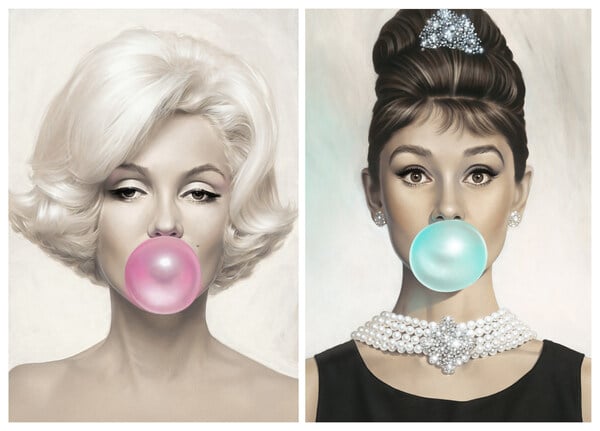Law & Politics
German Artist Michael Moebius Wins $120 Million in a ‘Monumental’ Lawsuit Against Hundreds of Foreign Counterfeiters
The news comes just a day after the U.S. Supreme Court's historic ruling against the Andy Warhol Foundation.

The news comes just a day after the U.S. Supreme Court's historic ruling against the Andy Warhol Foundation.

by
Adam Schrader

Michael Moebius, a German artist known for painting pop-culture icons blowing bubble gum, has won a “monumental” copyright infringement lawsuit against hundreds of foreign counterfeiters. The artist was awarded a total of $120 million, which his team called the “largest ever awarded to a living independent artist” in a statement.
“This is just the tip of the iceberg. It’s insane the infringements out there. If you Google ‘Marilyn bubble gum,’ 99 percent is all counterfeit,” Moebius told Artnet News.
“Obviously I did something right, because the art is attracting people for more than a decade and makes people happy. But the quality of the fakes really affects me. People wonder if they own the fake or the real ones. I feel so sorry for this and it really affects the market.”
Moebius sued 399 separate companies based in China and other foreign nations that he claimed had violated his copyright by selling “counterfeit versions” of his images, according to the complaint filed in the U.S. District Court for the Northern District of Illinois.
The artist also alleged that the companies had gone to “great lengths” to shield themselves from liability and “the full scope and interworking of their counterfeiting operation,” the lawsuit reads.
“Over a decade, I have faced hundreds of thousands of copyright violations of my artworks,” Moebius said in a post on Instagram ahead of the court ruling.
The ruling ending the case was issued after Moebius had filed a motion for a default judgment order against three final defendants who had failed to appear before the court, records obtained by Artnet News show.
“None of the defaulting defendants having answered or appeared in any way, and the time for answering having expired, so that the allegations of the complaint are uncontroverted and are deemed admitted,” the judge wrote in his decision.
Moebius had previously won default judgments against numerous other defendants from February through April after they had also failed to answer court subpoenas, while the artist moved to dismiss cases against several of the companies.
During litigation, some of the defendants had tried to fight off the lawsuit—pushing for dismissals and delays. Court records indicate that some of the defendants had hired a Chinese attorney to attempt to negotiate a settlement. Ultimately, nine companies entered into a settlement agreement with Moebius, he said.
During litigation, some of the defendants had tried to fight off the lawsuit – pushing for dismissals and delays while court records indicate that some of the defendants had hired a Chinese attorney to attempt to negotiate a settlement.
The judge, in his latest order, also permanently banned the companies from further selling any other products without permission from Moebius and the transfer of the company’s domain names to the artist’s control, court records show.
“In an environment where prestigious luxury houses like Hermès, Gucci, Louis Vuitton, and Dior grapple with rampant infringement, Moebius’s distinctive works have experienced similar challenges,” the statement from Moebius’s team reads.
“This parallel not only accentuates the global allure and high demand for Moebius’s creations but also underscores the landmark significance of this court case in safeguarding the sanctity of original artwork and intellectual property.”
Moebius said that his team has already started enforcing judgment against some of the companies. The artist currently has lawyers in Singapore and the E.U. working to enforce the U.S. judgment in those countries.
“We are also going to do another follow-up lawsuit in June,” a representative for Moebius told Artnet News. “It’s like whack a mole.”
As for the massive damages awarded to Moebius, his team said that the lawsuit could have been in the billions if he had not been so diligent in mailing DMCA takedown requests to websites such as Amazon and Alibaba.
Now, Moebius hopes that his victory can help inspire other artists to defend their copyrights.
“If someone had received a judgment like this before, I would have been much more confident going into this lawsuit. When you enter a case like this, its always an unknown area especially for artists who doesn’t know the law,” Moebius said.
The revelation of Moebius’s legal victory, formally won last week, came the same day the U.S. Supreme Court issued its verdict in photographer Lynn Goldsmith’s lawsuit against the Andy Warhol Foundation.
Goldsmith had sued the foundation over screenprints the legendary pop artist had made using a photograph she had taken of the late musician Prince before he became famous.
The Supreme Court ruled 7-2, with Associate Justice Elena Kagan and Chief Justice John Roberts dissenting, that Warhol had violated her copyright protection.
“She put so much money in her case and she actually succeeded,” Moebius said of Goldsmith. “She even needed to start a GoFundMe. That’s how hard it is to protect your I.P.”
The duo of legal challenges to copyright violations could set precedents for how artists and photographers can use the work of others and fight back when their own copyrights are violated.
Moebius himself has had to defend against claims of copyright infringement from other artists, he added. Because his paintings are of celebrities that are often dead, Moebius creates a collaged portraits from a dozen photographs to create his reference for painting.
“We know the famous portrait of Audrey Hepburn holding a cigarette but it’s so different from my image because of her delightful eyes,” Moebius said. “David Bowie had so many hairstyles in his career, so which are you going to choose?”